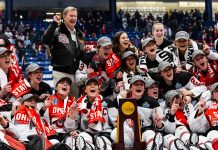III
Mike Cammalleri flew threw the autumn night.
He was a large part of the pantomime.
How do the Wolverines do it? Back in 1998, one year after graduating the fabled Michigan Nine, Michigan was a rookie-heavy team with an experienced goaltender, expected to have a respectable rebuilding season.
Instead, Michigan won the NCAA championship in Boston, on an overtime goal by then-freshman Josh Langfeld.
This year, Langfeld and classmates Mark Kosick and Scott Matzka are gone, leaving behind a rookie-heavy team with an experienced goaltender.
Yes, they lost Andy Hilbert. Yes, they lost Jeff Jillson. But look who returns, and look who they’ve lured to Ann Arbor.
The Youngster Also Rises
Every year, it seems, a Michigan “rookie” emerges as one of the elite players of the league. The list is a “who’s who” of young college hockey talent (and, not coincidentally, some early departures): Mike Comrie, Andy Hilbert, Mike Cammalleri, Mike Komisarek.
Michigan’s recruiting class is one of the best in the country, and six freshmen forwards will compete for ice time. Milan Gajic, a fourth-round 2001 NHL Draft pick of the Atlanta Thrashers, is the most promising rookie after notching 46 goals and 52 assists (98 points) with Burnaby of the British Columbia Junior Hockey League last season.
Michael Woodford (34-39-73) is another fourth-round pick (Florida Panthers), and David Moss was selected by Calgary in the seventh round.
Eric Nystrom, Jason Ryzner, and Dwight Helminen are all products of the USA Hockey National Team Development Program.
On the blue line, rookies Nick Martens, Reilly Olson, Brandon Rogers, and Eric Werner may all contribute right from the start.
“It’s one of the younger teams, there’s no question,” says Red Berenson. “I think it will be a year of opportunity, opportunity for the younger players and the returning players to really step into serious roles.”
Seriously.
The Old Men Are the Key
Let’s not forget, however, the players who return to the Wolverines this season. Junior Cammalleri (29-32-61) is poetry in motion; he and John Shouneyia are considered Michigan’s top two centers.
Defensively, there’s Komisarek, the unsung Mike Roemensky, senior Jay Vancik, and sophomore Andy Burnes.
Then there’s goaltender Josh Blackburn.
Still, there are only four seniors on the team, so leadership may be spread among the classes.
“Your team is typically as good as your seniors, and our juniors will have to be a big part of our senior experience,” Berenson says. “Our juniors will have to be a big part of our senior experience and leadership. How the upperclassmen play is going to dictate how this team plays.”
Three Angry Men
— UM head coach Red Berenson
With Hilbert and Jillson gone (and with the departure of senior Scott Matzka), the Wolverines have a golden opportunity to learn how to stay out of the penalty box.
Michigan averaged 21.68 minutes per game last season. Hilbert amassed 72 minutes, and the hot-headed Jillson spent 74 minutes in lockdown — but Matzka earned 100 of the Wolverines’ 964 minutes during the 2000-01 campaign.
Adding misery to an already volatile situation, the Wolverines weren’t exactly stellar when it came to killing off those penalties, with a .835 kill percentage (fifth in the league).
When the Wolverines concentrate on scoring, however, they appear to be successful, averaging almost four goals per game (3.75), second-best in the league.
“I think our fans are going to be excited about watching our young players fit in, develop and improve, and watching the players that need to step up and lead this team,” says Berenson.
“This will be one of the years where what you see in October will not necessarily be as good as what you should see in February and March.”
And little discipline, Wolverines, may make your March very rewarding.


